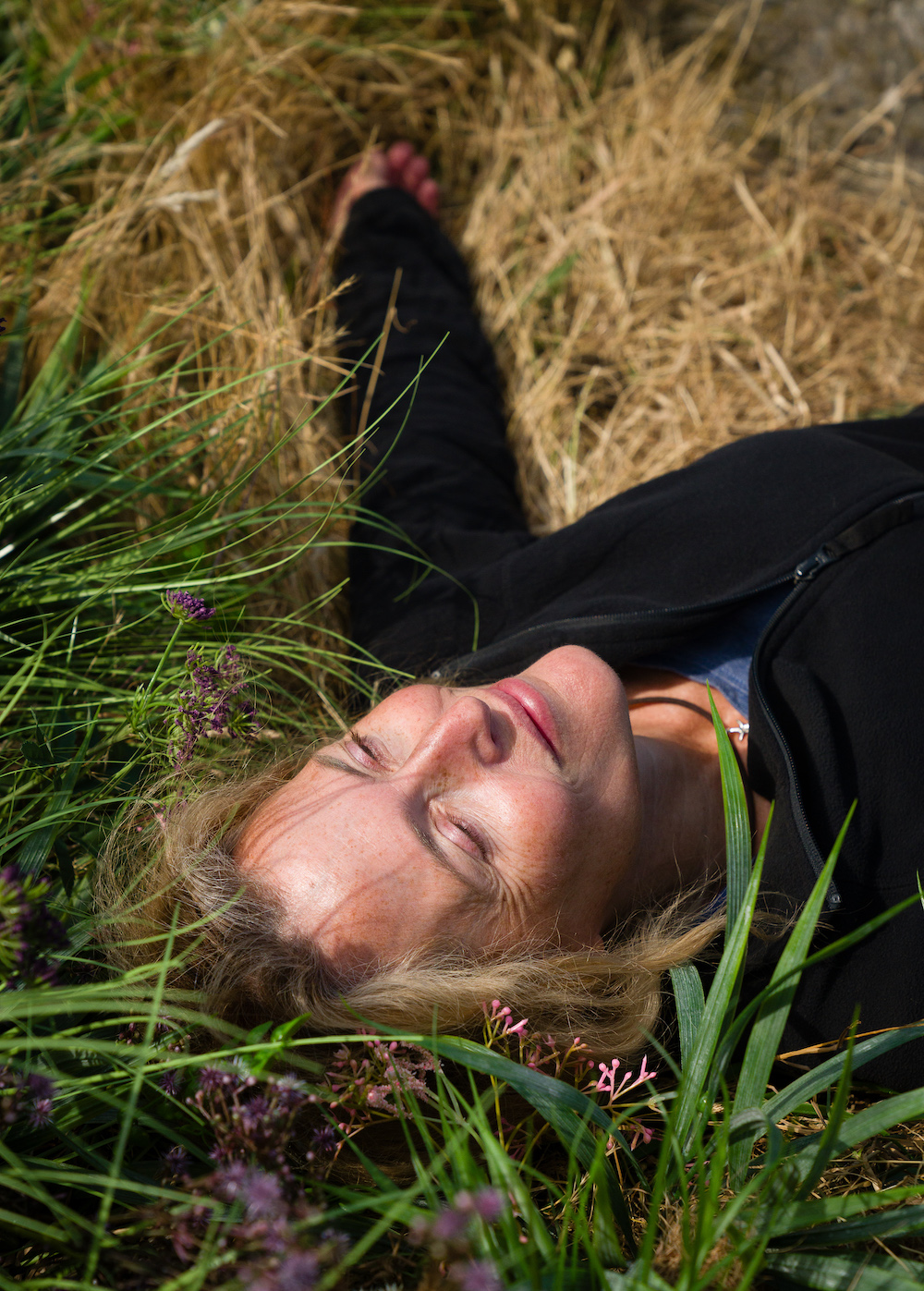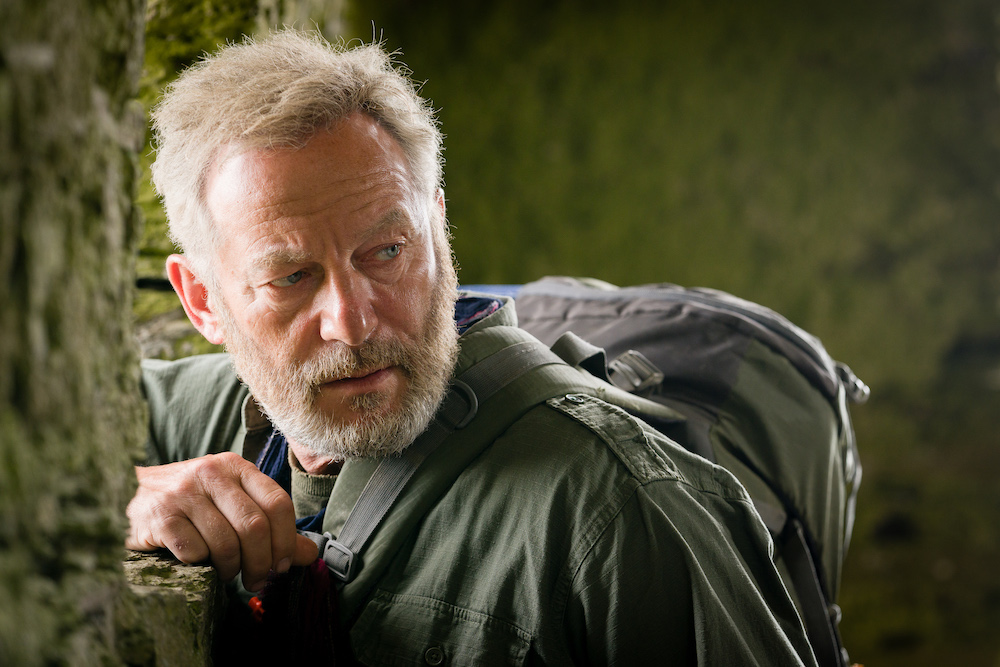“I can’t move my arms or legs, but apart from that I’m good to go.” Moth (Jason Isaacs) has to be pulled out of the tent in his sleeping bag by his wife Ray (Gillian Anderson). And this is only the second day of their 630-mile walk, split into two summers, along the south-west coastal path from Minehead to South Haven Point.
Raynor Winn’s moving, witty account of their trek, which they embarked on after being made homeless, was a bestseller in 2018. Perhaps inevitably, the eponymous film, in spite of having Tony-award winning theatre director Marianne Elliott at the helm (War Horse, Angels in America, Death of a Salesman) doesn’t quite live up to the book in terms of style, vivid narrative and characterisation.
This is Elliott’s first feature film, and she collaborated on the script with acclaimed playwright, screenwriter and actor Rebecca Lenkiewicz (Colette; She Said). But the dialogue doesn’t shine, sentimentality is dangerously near the surface and Moth’s character, in particular, seems one-dimensional, although Isaacs and Anderson are both impressive and locations, from Wales to Somerset, Devon and Cornwall, are beautifully shot by Hélène Louvart. And it does convey, though the pacing needs tightening up, what a massive struggle Ray and Moth’s mad enterprise is. The film’s non-linear structure doesn’t do it many favours, muddying the waters over exactly what happened to force them out of their idyllic Welsh farmhouse that they restored and where their two children, now about to go to university, were born, although one of the short – too short – flashbacks sees Moth yelling, “Cooper, you shit. Look me in the eye, coward,” at a man outside a courthouse.
The film’s non-linear structure doesn’t do it many favours, muddying the waters over exactly what happened to force them out of their idyllic Welsh farmhouse that they restored and where their two children, now about to go to university, were born, although one of the short – too short – flashbacks sees Moth yelling, “Cooper, you shit. Look me in the eye, coward,” at a man outside a courthouse.
They’d put money into Cooper’s company – “your stupid, stupid investments,” says Ray bitterly to Moth at one low point along the path – and when it failed, he held them liable for the debts, even though Ray finally found a letter that proved they weren’t. But too late. The judge finds in Cooper’s favour, and the bailiffs come knocking. In a harrowing scene (and there are many harrowing moments), they hide from them, their possessions strewn around, one of them being Paddy Dillon’s book The South West Coast Path. And also Seamus Heaney’s translation of Beowulf.
So, hey ho the wind and the rain, they decide, in their fifties, that their only alternative is to walk it. They don’t qualify for emergency housing, in spite of the limping Moth having just been diagnosed with corticobasal degeneration (CBD) a rare, incurable brain disease that has a six to eight-year prognosis – he’s probably already had it for about six years – and which ends in dementia and an inability to swallow. You don’t look that ill, says the girl at the housing office. “And if you’re not going to die within the next 12 months, I can’t call you a priority, can I?" Slipping into homelessness is easy. “Don’t tire yourself or walk too far and be careful on the stairs,” says the consultant. So wild camping and walking up and down cliffs to the point of exhaustion for months on end should be just what the doctor ordered. They buy the cheapest sleeping bags they can find and get a tent off eBay. Their daughter thinks they’re insane. But, surprise, it all turns out for the best, with many challenges and unexpected encounters along the way.
“Don’t tire yourself or walk too far and be careful on the stairs,” says the consultant. So wild camping and walking up and down cliffs to the point of exhaustion for months on end should be just what the doctor ordered. They buy the cheapest sleeping bags they can find and get a tent off eBay. Their daughter thinks they’re insane. But, surprise, it all turns out for the best, with many challenges and unexpected encounters along the way.
One of these comes in the form of Grant (James Lance) who pays for their ice-lollies after they’ve run out of water – they’re often penniless and desperately hungry, surviving on £40 a week in tax credits, though the money is not always in the bank when they expect it – and takes them back to his sumptuous house. He plies them with drinks and nibbles, and Moth is given a massage by one of an entourage of glamorous women. The scruffy Ray, her nose permanently sunburnt and peeling, feels out of place and mystified. Why do they keep referring to Moth as Simon and asking to take pictures of him? This has happened before on their journey. When it’s finally established that no, Moth is not the poet Simon Armitage (he and Ray have no idea who he is), they’re soon back on the road.
Armitage, it transpires, is on the same Cornish route as them, doing readings along the way, and this provides a running gag about Moth’s hidden poetic tendencies. Paddy Dillon, “power-walking superhero” and author of the guidebook, is another invisible presence, always under-estimating the time it takes to get from one point to another.
Near the start of the walk, Moth goes into a shivering decline. “Is this it?” he wonders. But it’s actually because he’s stopped taking pregabalin, prescribed for nerve pain and anxiety. He hates the side-effects – mood changes, brain fog – and within a short time he’s feeling better, more like himself and much stronger, able to carry the tent to safety when it’s almost swept away by a tide. His new resilience, as well as a deepening of their love, is one of the magical effects of the walk and of being in nature, with kestrels above and seals, deer and rabbits below. They’re lashed by gale-force winds, freezing and wet or warmed by the sun, eating blackberries lightly salted by sea-spray, or getting poisoned by a fall into a blackthorn bush.
“You’ve been touched,” says a woman at Portheras Cove. “You’ve felt the hand of nature. It won’t ever leave you now; you’re salted.”















Add comment